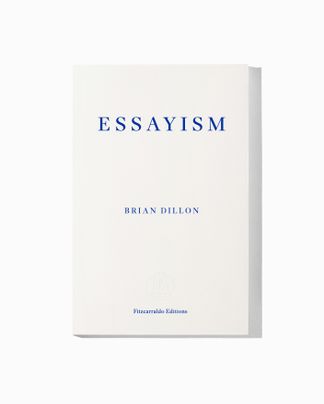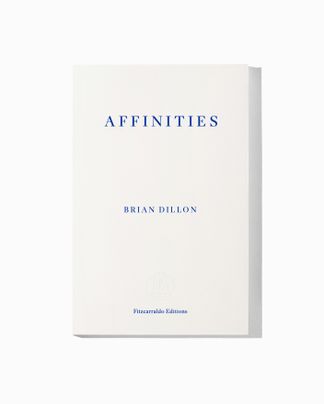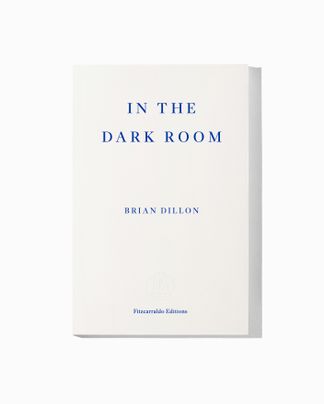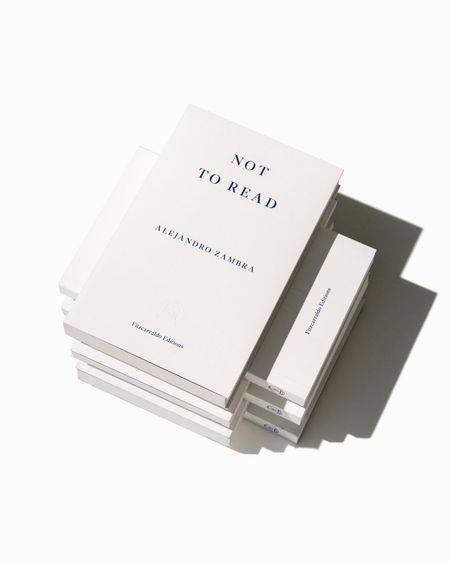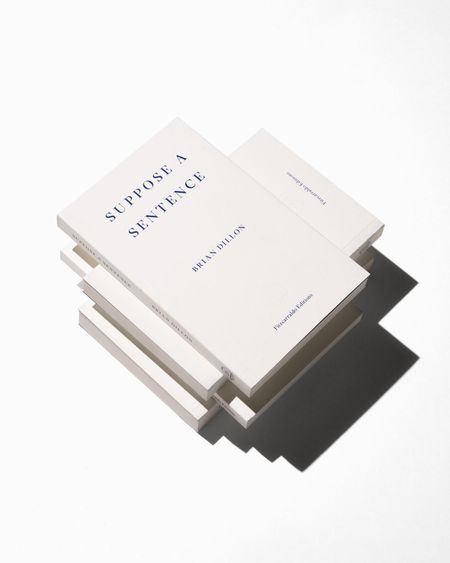In Suppose a Sentence, Brian Dillon turns his attention to the oblique and complex pleasures of the sentence. A series of essays prompted by a single sentence – from Shakespeare to Gertrude Stein, John Ruskin to Joan Didion – the book explores style, voice, and language, along with the subjectivity of reading. Both an exercise in practical criticism and a set of experiments or challenges, Suppose a Sentence is a polemical and personal reflection on the art of the sentence in literature. Whether the sentence in question is a rigorous expression of a state of vulnerability, extremity, even madness, or a carefully calibrated arrangement, Dillon examines not only how it works and why but also, in the course of the book, what the sentence once was, what it is today, and what it might become tomorrow.
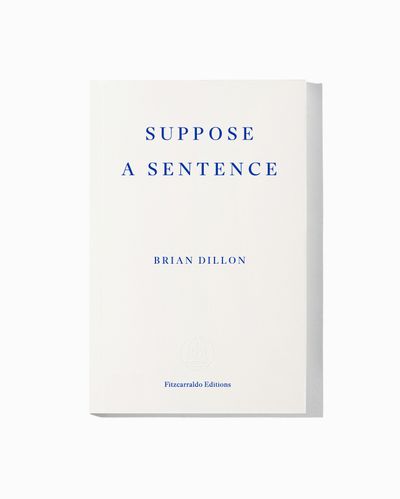
Suppose a Sentence
French paperback with flaps, 200 pages
Published 23 September 2020
Suppose a Sentence
SENSIBILITY AS STRUCTURE
Or maybe a short sentence after all, a fragment in fact, a simple cry, of pain or pleasure, or succession of same, of the same cries that is, compounded, and spoken at the last, in extremis, or another sort of beast entirely, whose unmeaning cry is just an overture, before the sentence sets in distinguished motion its several parallel clauses, as though it were a creature with at least four legs (‘Every sentence was once an animal,’ says Emerson), so slowly but deliberately intent on its progress, so stately in its procession, so lavish in attention to the world it passes through, so exacting in the concentration it demands in turn, that—what?—here already the sentence swerves, and although you are sure you’ve caught the sense the shape has begun to elude you, as if the animal in question were squirming or shaking itself loose of your grip, or turning to bite you and then take off, against all entreaties, into a mist of metaphor, where you must follow, closing the gate of this punctuation mark behind you; and on the other side everything is both less certain and suddenly, swimmingly, closer at hand: the sentence stops and looks around and starts comparing itself to the action of a drug, to the light-sucking lens of a camera or the slow apparition of an image (let’s say a face) on photographic paper, to festive decorations enchained about a church, or a storm speeding across the lake towards the place where its writer is sitting, or, or, or the sentence, which considers itself very modern, has grown tired of such figural adventures, not to speak of the antiquary’s accumulation of clauses and subclauses, so that you start to notice, start to notice certain acts of repetition (Repetition. But also. Interruption.) that give the sentence a faceted, crystalline quality it will always ever after possess, whether it wants to talk about sickness and health, about the sunlight outside Rome, a New York afternoon, a white boy who wants to be black, or the disappearing sun in day time, even if it is short, even if it is long, even (especially) if it still aspires to its old elegance, the lofty periods, the plush vocabulary, on which subject, by the way, the sentence has been taking notes—a sample from the archive: slumgullion, mandrelled, greaved, eidetic, soricine, macula, flimmering, glop, exorb, chthonic, brumous, moil, ort, flygolding, chlamys—and keeping tabs, in case these riches come in useful, because who can say what the sentence will need or want in the future, what expansions or contractions it may endure or enjoy, what knowledge need to muster and deploy, whose speech to steal and celebrate, where to be heard the rhythms it needs to live, to live and let slip your overly attentive attention, interesting itself in things and bodies and abstractions that you no longer recognize and whose names and outlines you will have to entrust to the slippery sentence itself, which it turns out knows more than you do, knows when to seize on and worry the world and when to let go, as it’s doing now, and go skittering away from you (its maker not its keeper), beating the bounds of its invisible domain.
For about twenty-five years I have been copying sentences into the back pages of whatever notebook I happen to be using, using mostly for other purposes. The brand, style and quality of these notebooks has changed a few times, but not their dimensions, or not much: they are all more or less A5, paperback-sized, at home in the hand or on the desk. Of course there are sentences elsewhere in these books: even the briefest, most telegraphic, verbless note is a sentence of sorts. And then there are the quotations and paraphrases from books, descriptions of people and places and things, as well as rough drafts of sentences later to be properly written, or not written. But the end-of-notebook sentences are different, even if some of them come from books I’m reviewing and so on. Unconnected to duty or deadlines, to projects per se, they compose a parallel timeline—of what?
(…)
New Statesman Books of the Year 2020 | TLS Books of the Year 2020 | Spectator Books of the Year 2020 | Observer Books of the Year 2020 | Lithub Books of the Year 2020
‘Each chapter focuses on a sentence chosen not for its historical importance, nor for its connection to the book’s other essays, but simply out of love. As Dillon puts it, his chief criterion is a sense of “affinity.” What emerges is a record of appreciation, a rare treasure in an age that rewards bashing.’
— Becca Rothfeld, New York Times
‘Essayist and critic Brian Dillon is in thrall to sentences. For a quarter of a century, he tells us in his marvelous new book, he has been collecting them, in “the back pages of whatever notebook I happen to be using”.… The product of decades of close reading, Suppose a Sentence is eclectic yet tightly shaped. Mr. Dillon has a taste for the more eccentric prose stylists, and lights with delight upon the likes of John Ruskin.… His essay on Thomas De Quincey is a small masterpiece…. The best and certainly most beautiful piece in the book is on Roland Barthes, “the patron saint of my sentences” without whom “I would never have written a word.” It is easy to understand what Mr. Dillon means when he speaks of Barthes, one of whose books is called A Lover’s Discourse, as “the most seductive writer I know,” for Mr. Dillon’s own book is a record of successive enrapturings.’
— John Banville, Wall Street Journal
‘Dillon, with his Suppose a Sentence, a collection of reflections on the nature of the sentence, made me wonder why any of the rest of us bother trying to write non-fiction.’
— Ian Sansom, TLS
‘The book has a lot of what I can only call pleasure – of the kind that I imagine athletes or dancers experience when they are doing what they do, which is then communicated to those watching them do it. I share with Dillon some misgivings about general theories and overarching ideas, but in thinking about the writing I enjoy most, this quality feels like the one constant: that the author takes some pleasure in using these muscles and finding them capable of what they are asked. That delight is evident both in the sentences Dillon looks at and in those he writes himself.’
— Hasan Altaf, Paris Review
‘Reducing great writers and works to a single sentence is a provocative act, but one that in an age of 280-character opinions does not feel inappropriate. Used as we are to monosyllabic messaging and governance by tweet, it is an important reminder of the potential beauty, rather than mere convenience, that can be conjured in concision.… Suppose a Sentence is an absorbing defence of literary originality and interpretation, inviting us not just to take words as they first appear but to let them abstract themselves before our very eyes.’
— Chris Allnut, Financial Times
‘Dillon demonstrates that reading out of love, lingering over cherished sentences, can draw out an astonishing wealth of material. These sentences are like old friends, with the constant ability to still surprise, even after many years of knowing them.… Dillon, in this collection, keeps his eyes on both: the sentence, as a beautiful object, is both one thing and many things, an extraordinary, almost unknowable, composition of parts.’
— Katie da Cunha Lewin, Los Angeles Review of Books
‘Essayist Dillon begins with a fascinating area of investigation – what happens when we pause to consider the potential mind-maps which might be inspired by a single, particularly nuanced sentence? He takes sentences from all kinds of writers … and forensically dissects them, sparking a very readable, chatty inquiry into context, voice, biography, etymology, cultural and political history. I might have made this book sound tediously nerdy and dry; instead it is an absolute joy, like getting gently drunk with a convivial big thinker and contagious enthusiast.’
— Jane Graham, Big Issue
‘I loved Suppose a Sentence by Brian Dillon. It’s pleasingly nerdy: a collection of short essays, each on a single sentence, each mixing close reading, biography and the occasional dazzling flash of insight into the pure pleasure of reading and why we bother to do it at all.’
— Daniel Swift, Spectator
‘Think of Suppose a Sentence as a contemporary instance of the commonplace book, in which quotations from approved authors are assembled and juxtaposed in a way that may spur further reading and writing…. The real thread that binds Dillon’s book of sentences is not a set of constraints, but something more essayistic in spirit: the wish to honour the mystery of these fragments that have had an enduring pull on him…. Here language no longer points to what it names but seeks to become it. Sounds are not arbitrarily linked to meanings but try to persuade us of their necessity through sheer descriptive prowess.’
— Louis Klee, The Monthly
‘In this delightful literary ramble, Dillon (Essayism), a creative writing professor at Queen Mary University of London, expounds upon remarkable sentences from a variety of voices in literature, past and present…. The well-chosen sentences themselves are worth the price of admission, but Dillon’s encyclopedic erudition and infectious joy in a skillful piece of writing are what stamp this as a treat for literary buffs.’
— Publishers Weekly
‘Taking as his starting point a sentence that has intrigued him for years or, in some cases, come into his ken more recently, Brian Dillon in Suppose a Sentence ranges through the centuries exploring the associations of what he observes and discovers about his object of study and its writer, through biographical anecdote, linguistic speculation, and a look at related writings. This rich and various collection resembles a beguiling, inspiriting conversation with a personable and wry intelligence who keeps you happily up late, incites you to note some follow-up reading, and opens your eyes further to the multifarious syntactical and emotional capacities of even a few joined words of English. Enjoyable and thought-provoking reading!’
— Lydia Davis, author of Can’t and Won’t
‘Dillon has brilliantly reinvented the commonplace book in this witty, erudite, and addictively readable guide to the sentences that have stayed with him over the years.’
— Jenny Offill, author of Weather
‘Brian Dillon is one of the true treasures of contemporary literature – a critic and essayist of unmatched style, sensitivity and purpose – and Suppose a Sentence is a book only he could have written. It’s an inspired celebration of the sentence as a self-sufficient artform, and reading it has reinvigorated my sense of the possibilities of writing itself.’
— Mark O’Connell, author of Notes from an Apocalypse
‘Reading Brian Dillon’s brilliant book, I was repeatedly struck – because each one of the book’s short sections is a wholly captivating demonstration of this fact – that a sentence, just a single sentence, can hold and release an event. “Close reading”, in Dillon’s hands, starts to look like a form of “close living”: a life-practice that makes an everyday value out of paying serious, open-minded attention, especially to what is hard to understand.’
— Kate Briggs, author of This Little Art
‘Brian Dillon has a way with and among ideas, rather an unusual one. His acute noticing supposes, as he says along with Gertrude Stein, a singular sentence in some text of these wildly differing authors, and then expands upon that notice, moving us around within and without the very particular wording to the everything else around. He dives in for some detail(s) of each called upon part of a whole, surprising us and himself by his swerves and metaswerves, offering them delightedly up to a joint self-awareness in the reading. Very close-up and personal, the style wrapping around itself, like the ouroboros, this animal waiting to be found.’
— Mary Ann Caws, author of Creative Gatherings
Brian Dillon was born in Dublin in 1969. His books include Suppose a Sentence, Essayism, The Great Explosion (shortlisted for the Ondaatje Prize), Objects in This Mirror: Essays, I Am Sitting in a Room, Sanctuary, Tormented Hope: Nine Hypochondriac Lives (shortlisted for the Wellcome Book Prize) and In the Dark Room, which won the Irish Book Award for non-fiction. His writing has appeared in the Guardian, New York Times, London Review of Books, the New Yorker, New York Review of Books, frieze and Artforum. He has curated exhibitions for Tate and Hayward galleries. He lives in London.

